A single home buyer's journey during Covid-19: How I bought and built my own home


The Singapore property market is known for being tough on single homebuyers; and it’s especially hard to find an HDB flat as a bachelor.
Nonetheless, some home buyers do manage to build their ultimate bachelor pad, with a bit of patience and homework. This week, we talked to S, who put together an incredible 4-room flat bachelor pad; and he even managed to get it done despite Covid-19 raging. Here’s how:
Most Singaporeans wait till they’re married – or almost married – before looking for a home, applying for a flat, etc. However, things don’t always work out that way.
“Like most, I long subscribed to the life plan of finding a life partner and we’d buy our first home together, all before turning 30,” S says, “But I haven’t been lucky in love, so when I hit my 30s, the game plan had to evolve.”
Besides being a step forward in life, Covid-19 provided further incentive for S to get his own home.
“I’m also someone who likes to be on the move, whether it’s travelling or even just commuting to and fro from work. So the idea that I’d still be living with my family as an adult always irked me, like I hadn’t made any strides forward in life.
Add to that a pandemic which severely curbed all our movements, and I found myself fixated on the idea that I really, really needed to move out and find a space to call my own.”
However, S was not an experienced property hunter. It took a while for him to check out different segments of the market, and narrow the criteria.
“I was a terrible property hunter, mostly because I couldn’t settle on what I wanted. From the end of 2019, I viewed a wide range of properties, from one- and two-bedroom condo units, to ECs, DBSS flats and HDB flats,” S says.
Actually, we think this makes S a better property hunter than he may think.
A common problem with new buyers is that they do know what they want, even without doing their homework. Many first-timers storm into the market insisting their first property must be a condo, a 5-room flat, an EC, or so forth.
This can lead to closed-mindedness, and buying a property they regret later. S had an advantage over this batch of buyers, as he was open enough to consider different options.
S eventually settled on a 4-room resale flat in Bukit Panjang. While he was open to various property types, he was clear on his needs, which the flat meets:
“I love hiking and being near Nature, so I’m grateful to be surrounded by parks – three or four, in fact, all a stone’s throw away from where I live. They also afford me a view of unspoilt green landscape, which is what I love about my flat…
…I have Zhenghua Nature Park just across the road from my flat, and that connects to Dairy Farm Nature Park. It’s also linked to Chestnut Nature Park when I’m in the mood for a slightly rougher hike. Bukit Panjang Neighbourhood Park is around the corner and has a very Instagram-worthy boardwalk above Pang Sua Pond.”

S can also cook, and enjoys doing so. This mitigates the need to have a lot of eateries nearby: “I love to cook, so while there is a huge hawker centre 10-minutes walk away, I’m more appreciative of the three very serviceable grocery stores nearby.”
S also took accessibility into account:
“Transport links are always an important consideration. Bukit Panjang isn’t the sexiest location to live in, but as a car owner, I have quick access to the BKE/PIE. And on days I don’t drive, the Downtown Line gives me direct access to the city.”
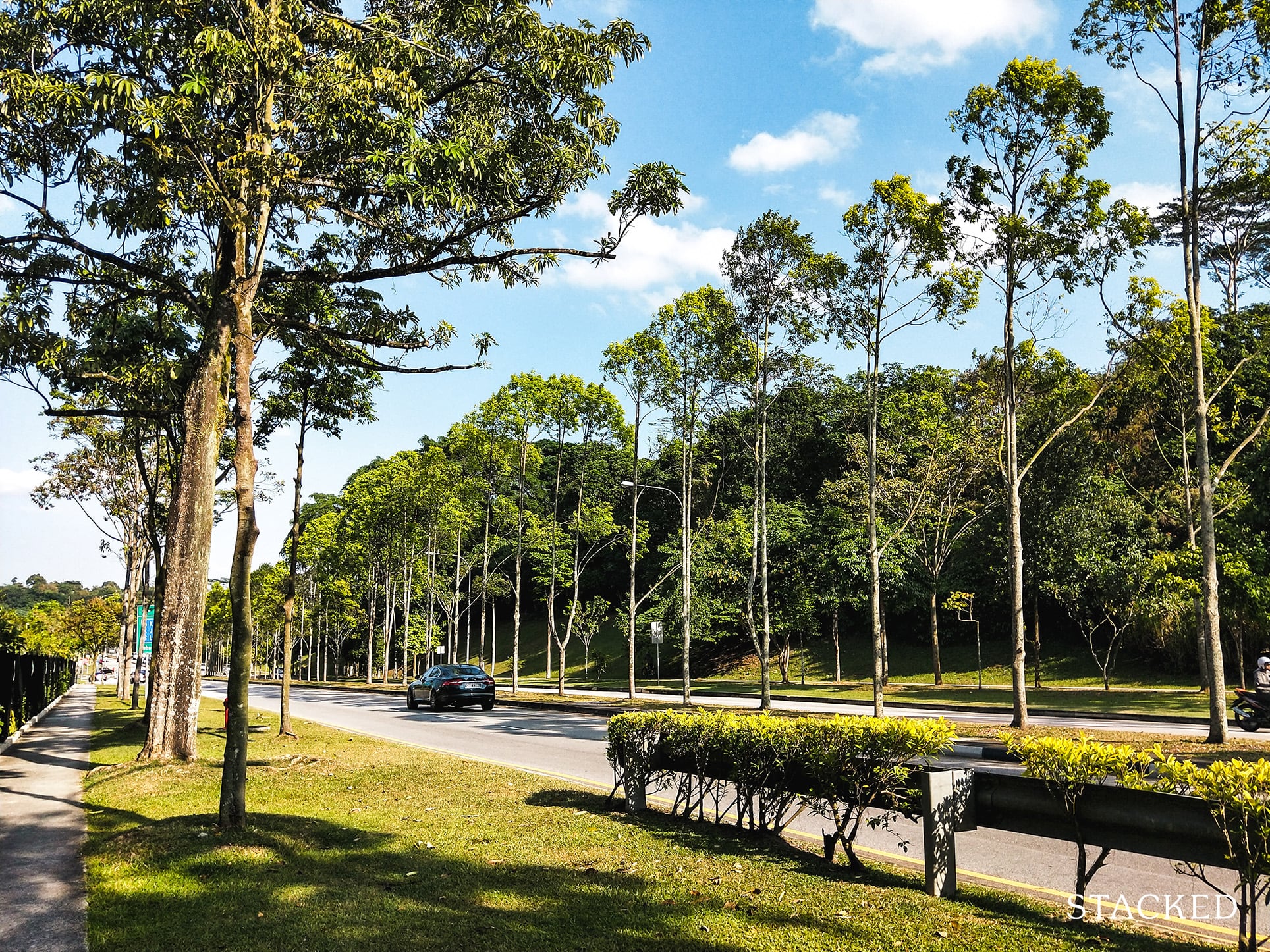
One thing we found interesting was the size of the unit that S went for. It’s often assumed that singles don’t need much space; but generalisations don’t hold for everyone. In fact, one of the reasons S picked a flat instead of a condo was being able to afford more space:
“The best thing I love about it (the flat) is the space. Going for an HDB flat was the only realistic way I could afford 1,000 square feet. With the space, I have enough room to set up a home office and gym, which is extremely useful in these times.”
As a single, S feels the only real difference between him and a family unit is having to worry about schools and childcare being nearby. These weren’t a concern to him at this point.
In shortlisting properties, S also made it a point to avoid properties older than 10 years, to avoid depreciation. This is a bit strict though – we would usually give a project about 20 years before lease decay starts to be a major concern (excepting freehold properties, where the lease is not a concern).
S also had a general sense of wanting to be in the West or North of Singapore. While he wanted his own space, this would allow him to still be close to family. As mentioned before, he also picked out the units that were near large parks, and had a good view of the greenery.
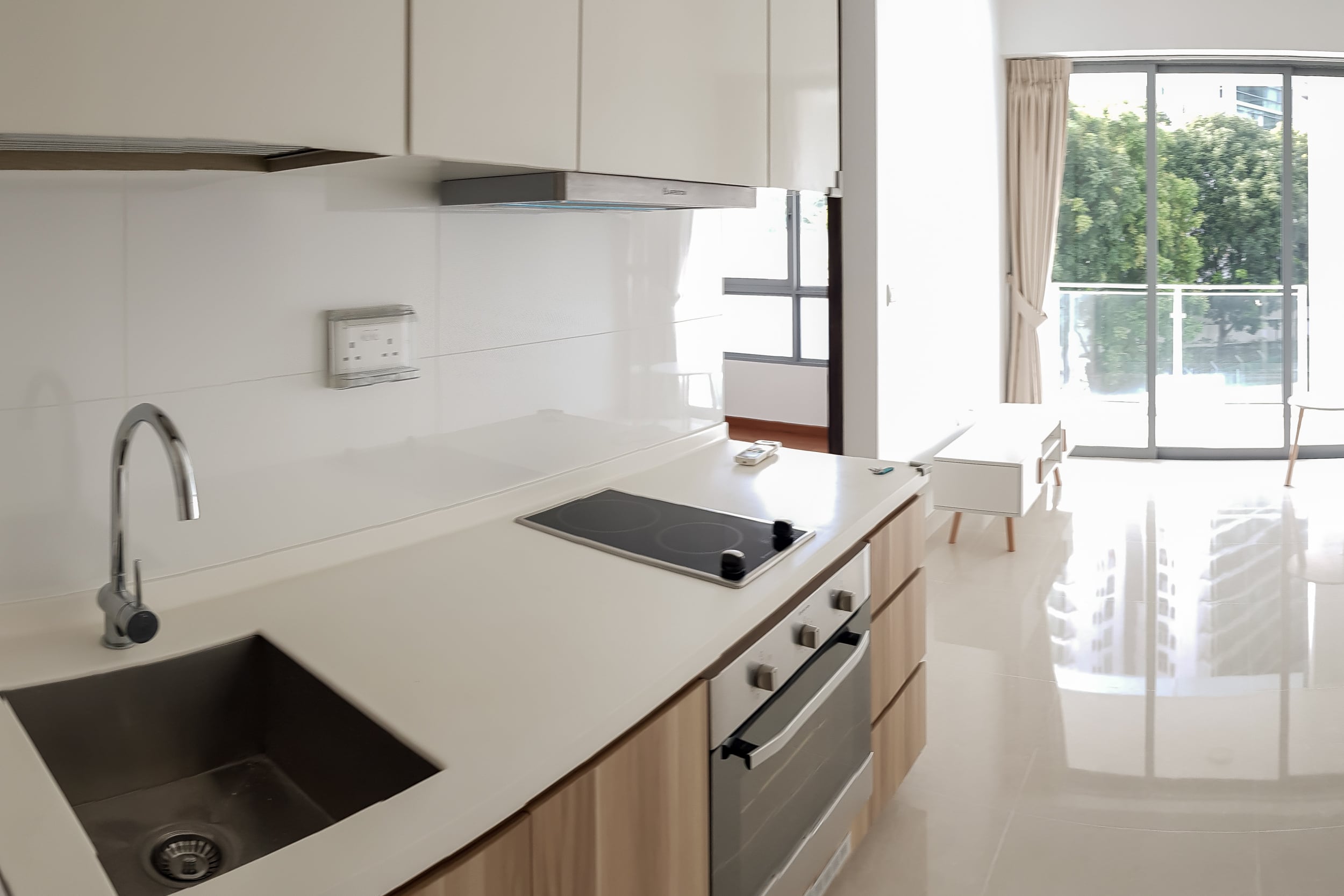
“These were either one-bedroom condo units, or three- or four-room HDB flats,” S says. “I think the unblocked green views made these properties very desirable, so I faced stiff competition from other buyers. I’d rock up to the viewing, and the selling agent would immediately tell me there was an offer already…and I had till the end of the day to put in mine!
It was too much pressure to make such a big decision so quickly.”
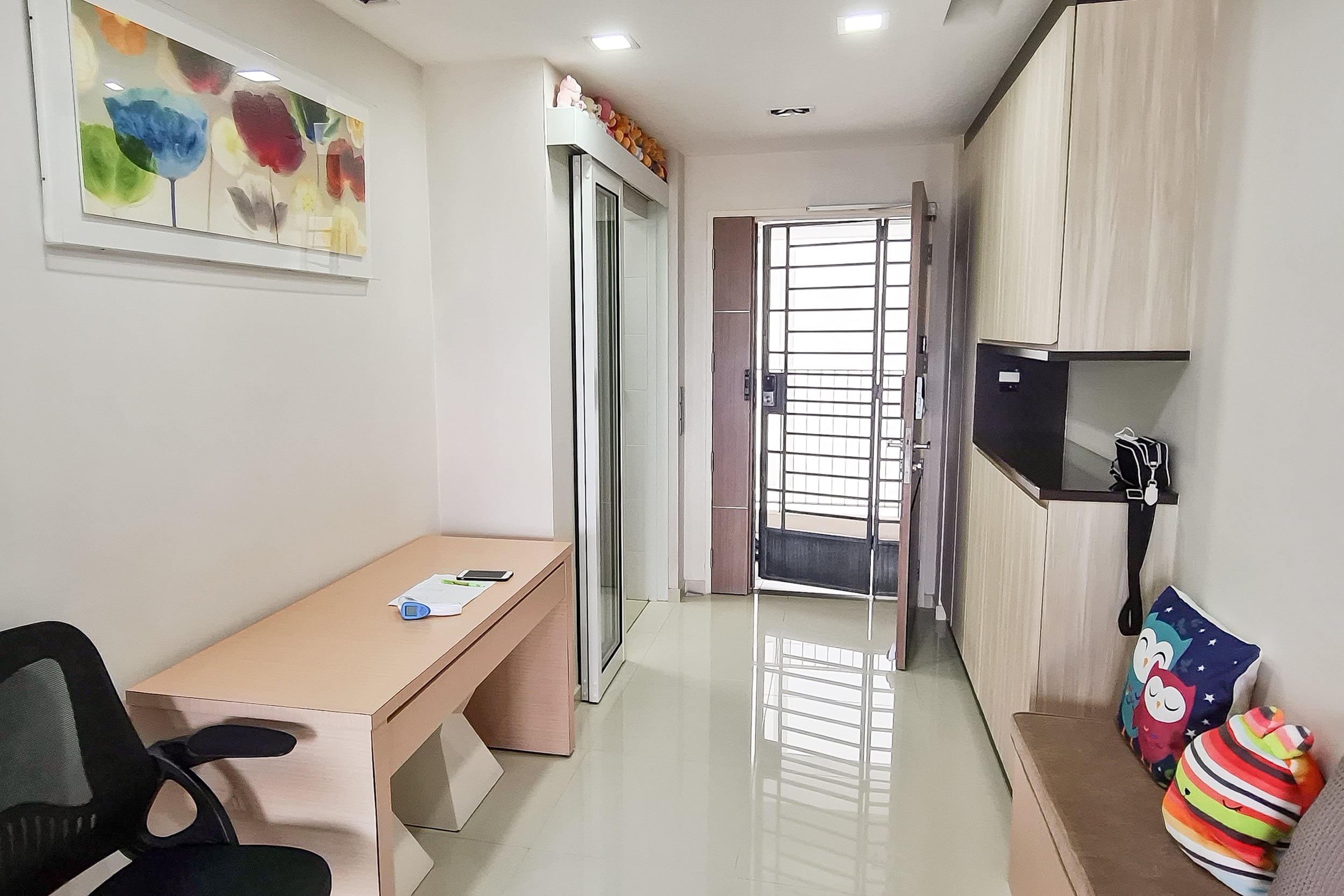
“There was a one-bedroom condo unit in Yishun right across from Lower Seletar Reservoir that I absolutely loved. It was large for a one-bedder at 600 square feet, and had a gorgeous unblocked green view.
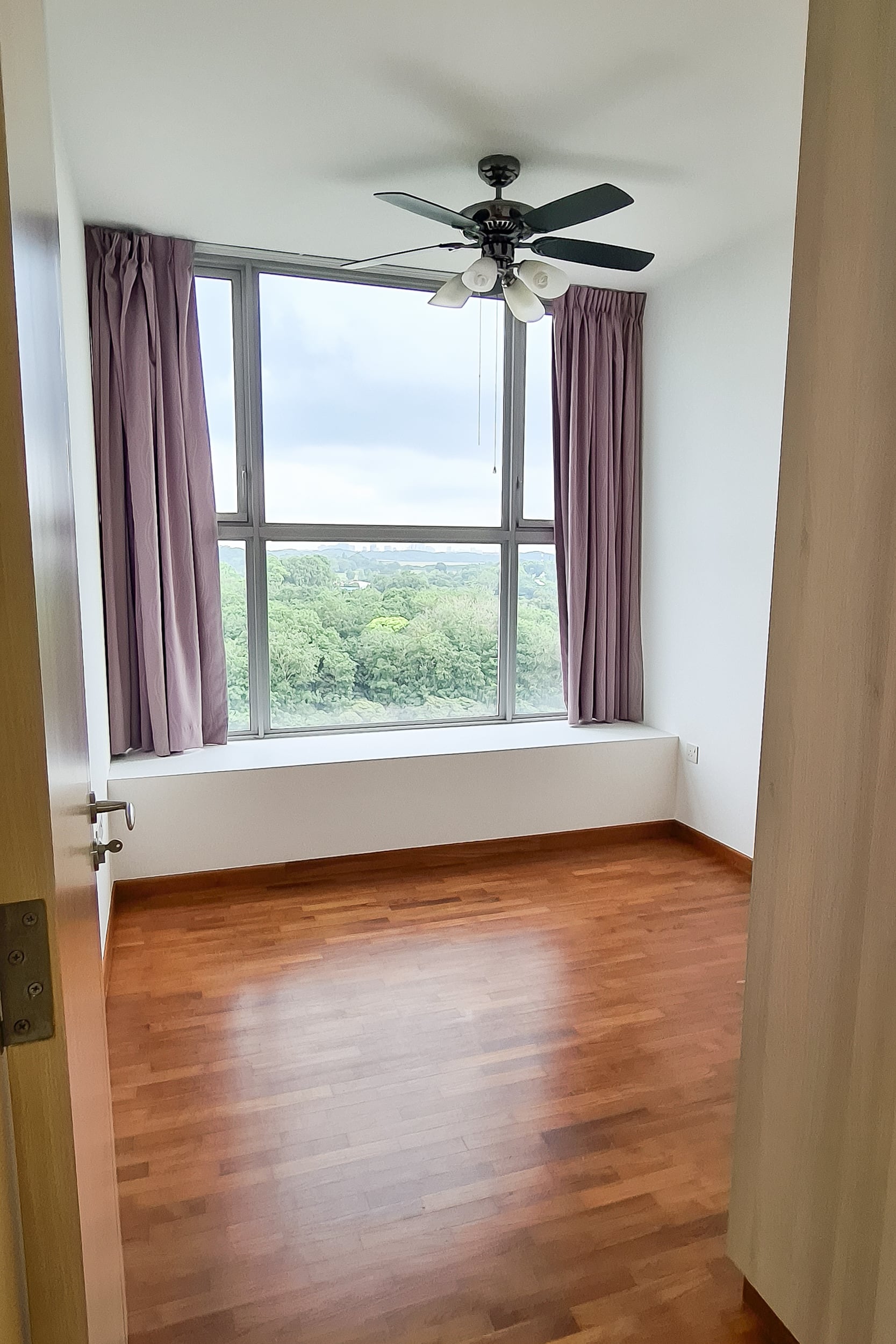
It had TOP-ed in 2013, and the unit was quite well maintained by the previous owner, so I didn’t anticipate doing much renovations. I was so convinced that I was going to buy the unit that I sent the floorplan to my ID even before my offer was accepted! (Big mistake.)
The snag was that the unit was priced just above my budget. The owner rejected my offer, and I didn’t feel financially secure enough to meet his counter-offered price. I had to let that unit go, much to my dismay.”
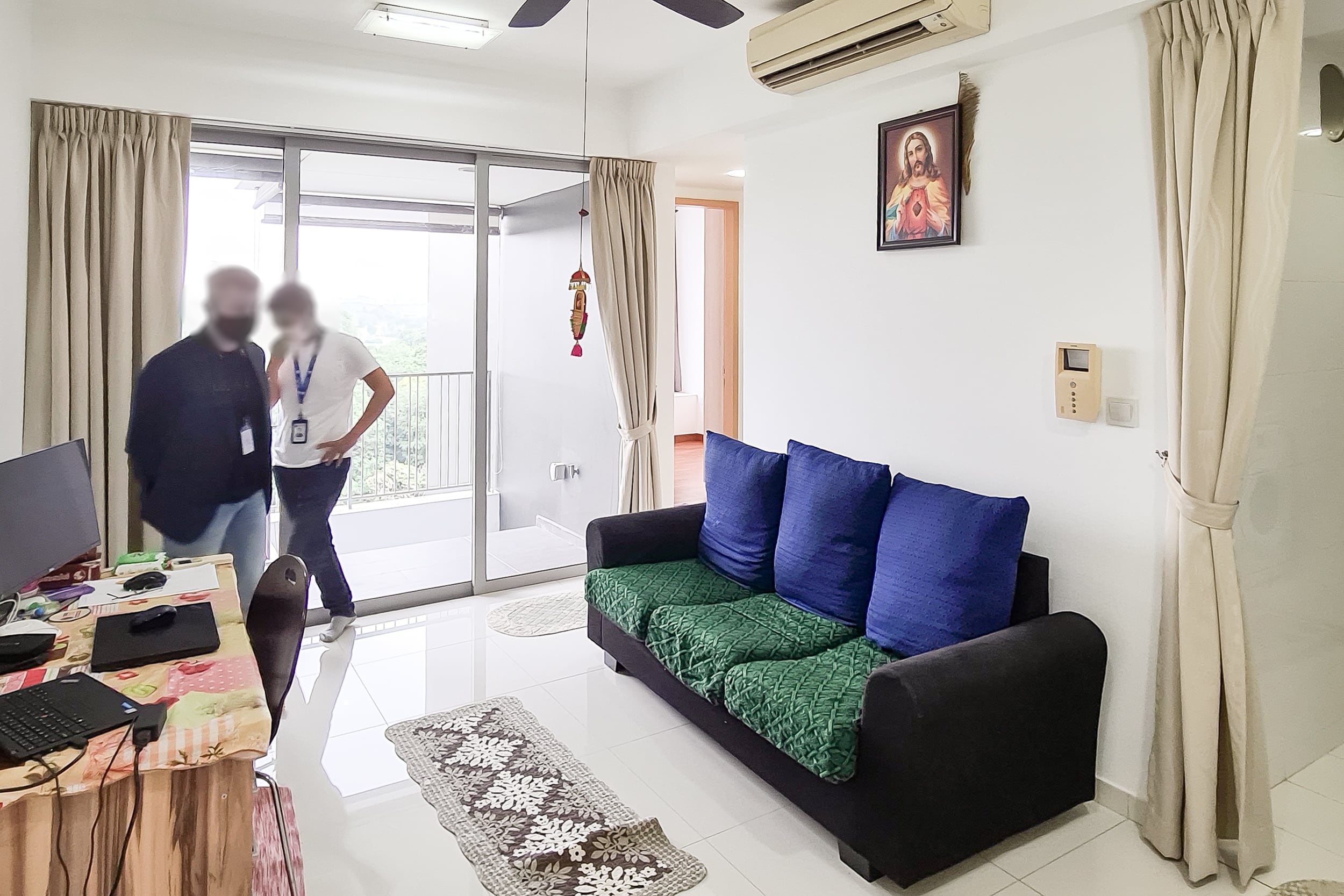
While it’s disappointing to lose out on a unit, S made a smart move by going in with a clear budget.
First-time homebuyers can be under immense pressure, when there are competing bids. This is made worse if they don’t plan their finances beforehand – not only does it become more stressful, it can lead to impulsive decisions that aren’t easy to undo.
Have a number in mind, and stick to it – no matter how hard it may be to let go at times. Speaking of which, here’s how S went about…
“The upper end of my budget had been intended for a condo unit, so in a way, I had considerable savings by purchasing an HDB flat,” S says.
“But the pandemic definitely had an effect on the property market, some disadvantageous, but some not entirely so.
When I restarted my property hunt after Circuit Breaker, I could tell there was a growing demand for resale property. There was almost always a line at each property I viewed, and some even had offers despite being on the market for barely a week. I felt I had to make my property purchase soon before prices rose, which they have now a year on.
On a positive note, home loan interest rates were extremely favourable. I could take out a slightly larger loan than I’d initially planned, which gave me more liquidity for renovations and furnishings.”
Home loan rates are currently at record lows, averaging around 1.3 per cent. However, we suggest looking beyond low rates, as these could rise again in the future.
As a rule of thumb, we suggest that any property you buy should not exceed five times your annual income. The monthly loan repayment should not exceed 30 per cent of your monthly income (for HDB properties, the 30 per cent cap is enforced under the Mortgage Servicing Ratio).
“I’d read online that the average renovation costs for a 4-room HDB flat was $50,000, but because of the pandemic I bumped that up by about $5,000,” S says.
“I ended up spending 12 per cent over my renovation budget. But I was fortunate that my interior designer was extremely transparent with the additional costs, which were mostly to deal with ‘surprises’ discovered after I’d taken over the flat.
For example, I only discovered, after I’d gotten the keys, that there were two rows of floor tiles at the entrance of the kitchen that I didn’t like. These tiles had been covered up by carpets during my earlier viewings.
I wasn’t intending to hack any of the floors, and I didn’t want vinyl overlays in the kitchen. So, my solution was to build carpentry over the offending tiles. I had shoe cabinets and a bar cabinet built, which walled off the kitchen and created an enclosed foyer space at the front door to remove and put on shoes, and to receive guests.
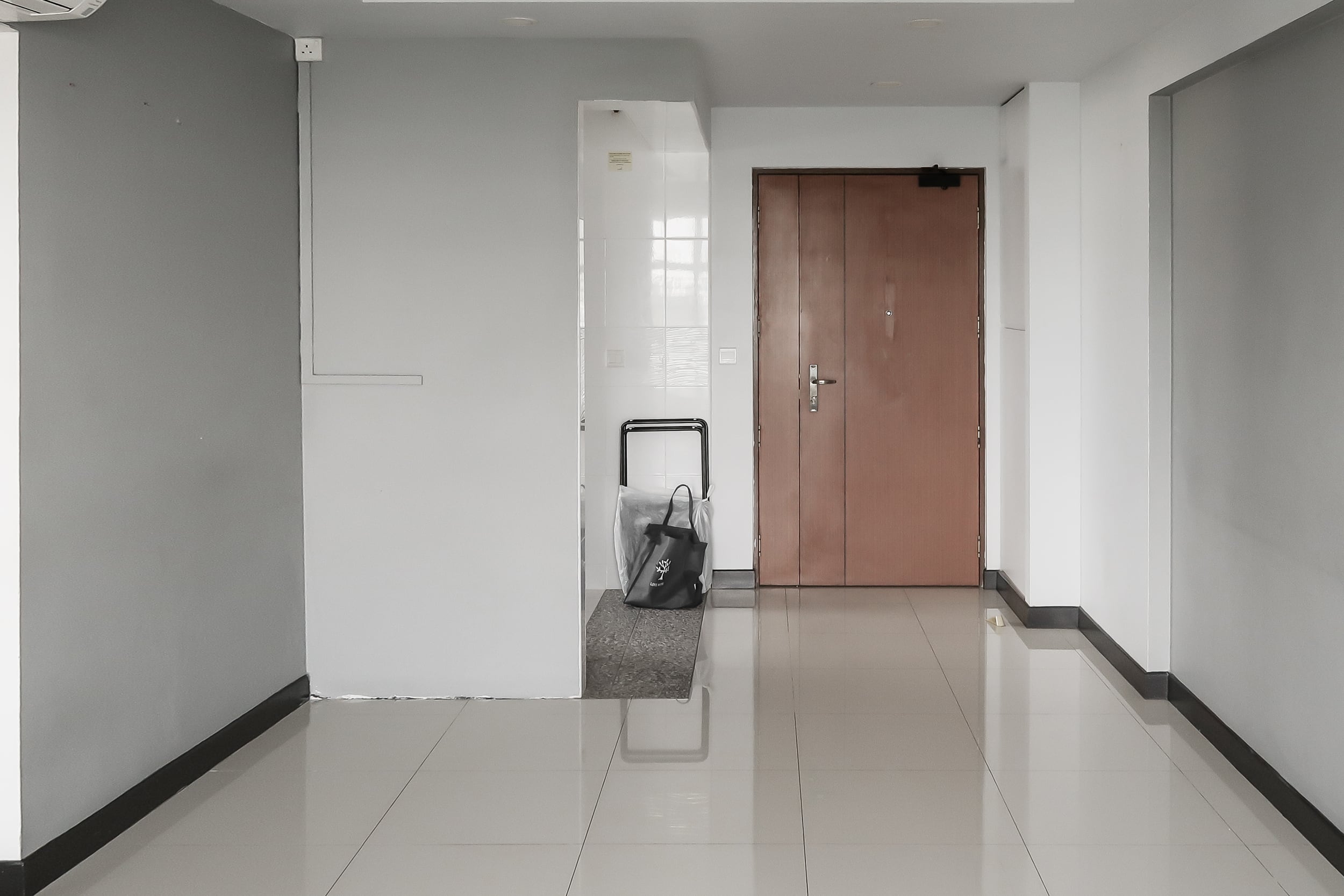
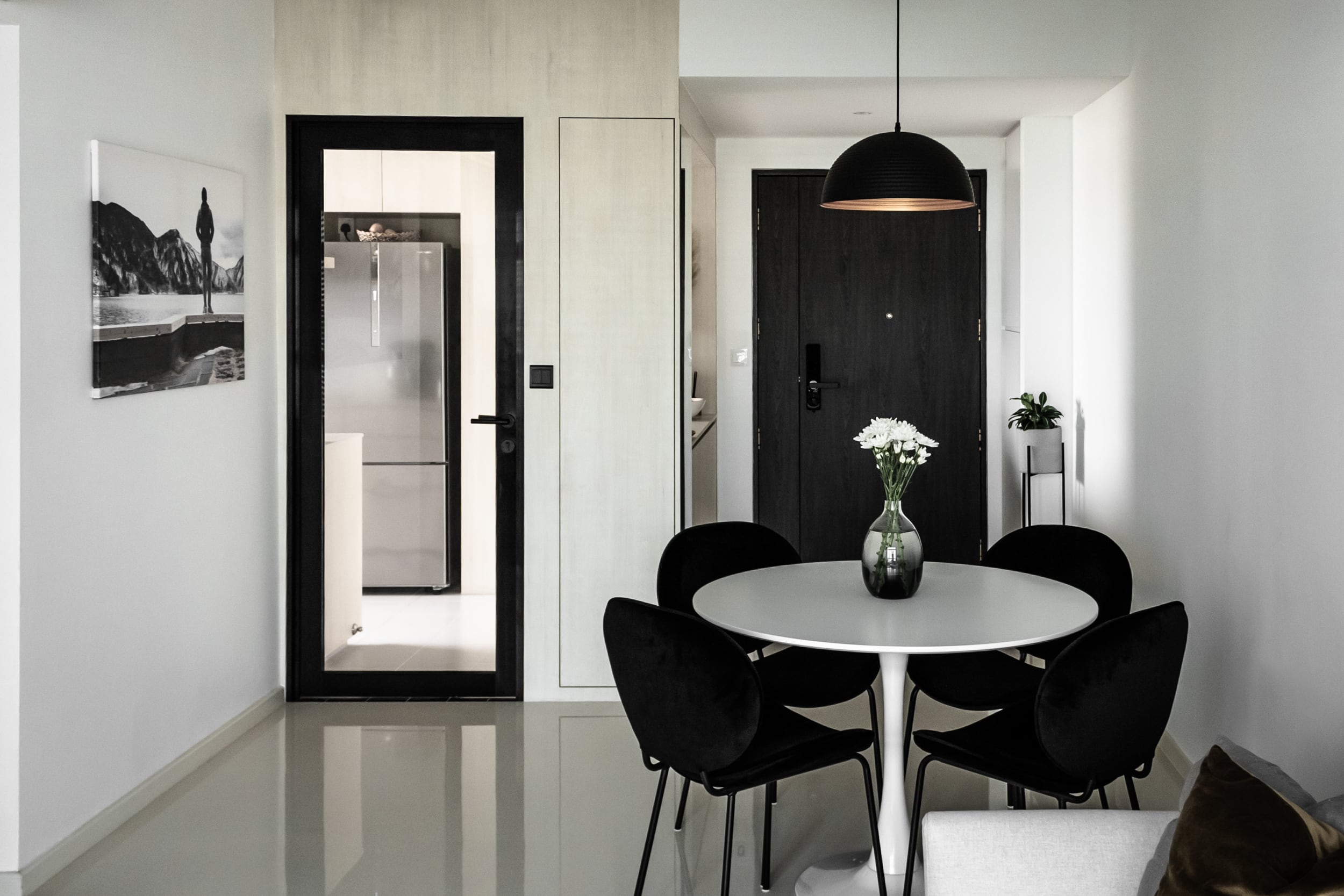
The extra carpentry definitely inflated renovation costs, but I love the end result. I’d even go so far as to say my entryway carpentry is one of the defining features of my home.”
As an aside, we’d point out that raised renovation costs may not just be for the duration of Covid-19.
Once prices go up, it’s quite rare for them to come down again, as the market adapts to the new price tag. There is, unfortunately, a chance that Covid-19 prices are going to be a part of renovation costs – even long after the pandemic is over.
Keep this possibility in mind, if you’re thinking of stalling renovations till “after Covid”.
“After the offer on my flat was accepted, I sat down and wrote a design brief that ended up being 30 pages long. It had a selection of inspiration images, my notes on what I wanted and what were the non-negotiables, and what I intended to do with each space in the flat. It was part mood board, part wish list, part space planning document.
With the brief, I went looking for an interior designer. I interviewed five large ID firms, all with major IG cred, and they turned in varied but excellent interpretations of my brief.”
While you don’t have to go into 30 pages like S did, it’s a good idea to have some examples before speaking to an ID. This will speed up the process, and allow them to give you more accurate quotes.
“In the end, I wanted an ID I could trust. So I chose Hans, who runs the boutique outfit White Ideas (@whiteideaspteltd) with his wife. Hans and I have also been friends for almost two decades.
It might seem, with my being friends with Hans, that he had an unfair advantage. But in fact, it was Hans who encouraged me to shop around to find an ID firm that best suited my needs. I chose Hans because I love all the work he’s done, and he was able to come up with a design that aligned with my vision (and budget). He simply was the best person for the job.”
Your personal relationship with a designer is often more important than the branding, or the firm’s awards. If you’re on the same page with the designer, you’re more likely to get what you want.
Sometimes award-winning IDs can be great at their job, but terrible at listening. Even if their designs are fantastic by industry standards, those designs might not work for you, and your specific needs.
“I somewhat shifted away from the original vision for my home’s interiors, both to save on renovation costs and in response to the actual physical space of the flat,” S says.
Based on Hans’ advice, S chose timeless over trendy. This ensured he would be happy with the flat for years to come. However, this resulted in a shift in colour preference.
“I decided to let go of strong colours and gravitated towards whites and neutrals. I found myself reducing the colour and material palettes. In fact, I told Hans that I’d be very happy if he delivered me a white box of a flat at the end of the renovations!”
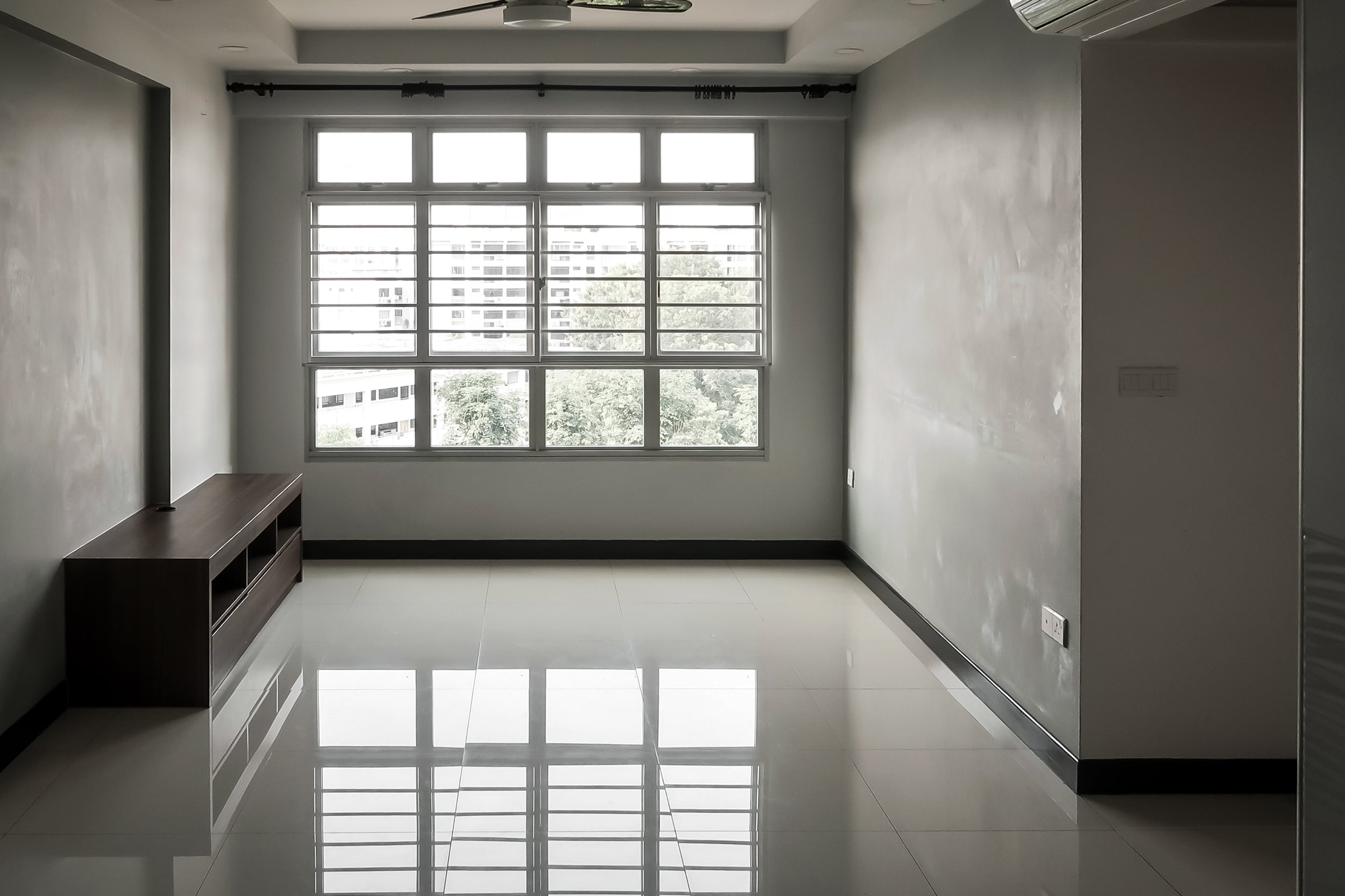
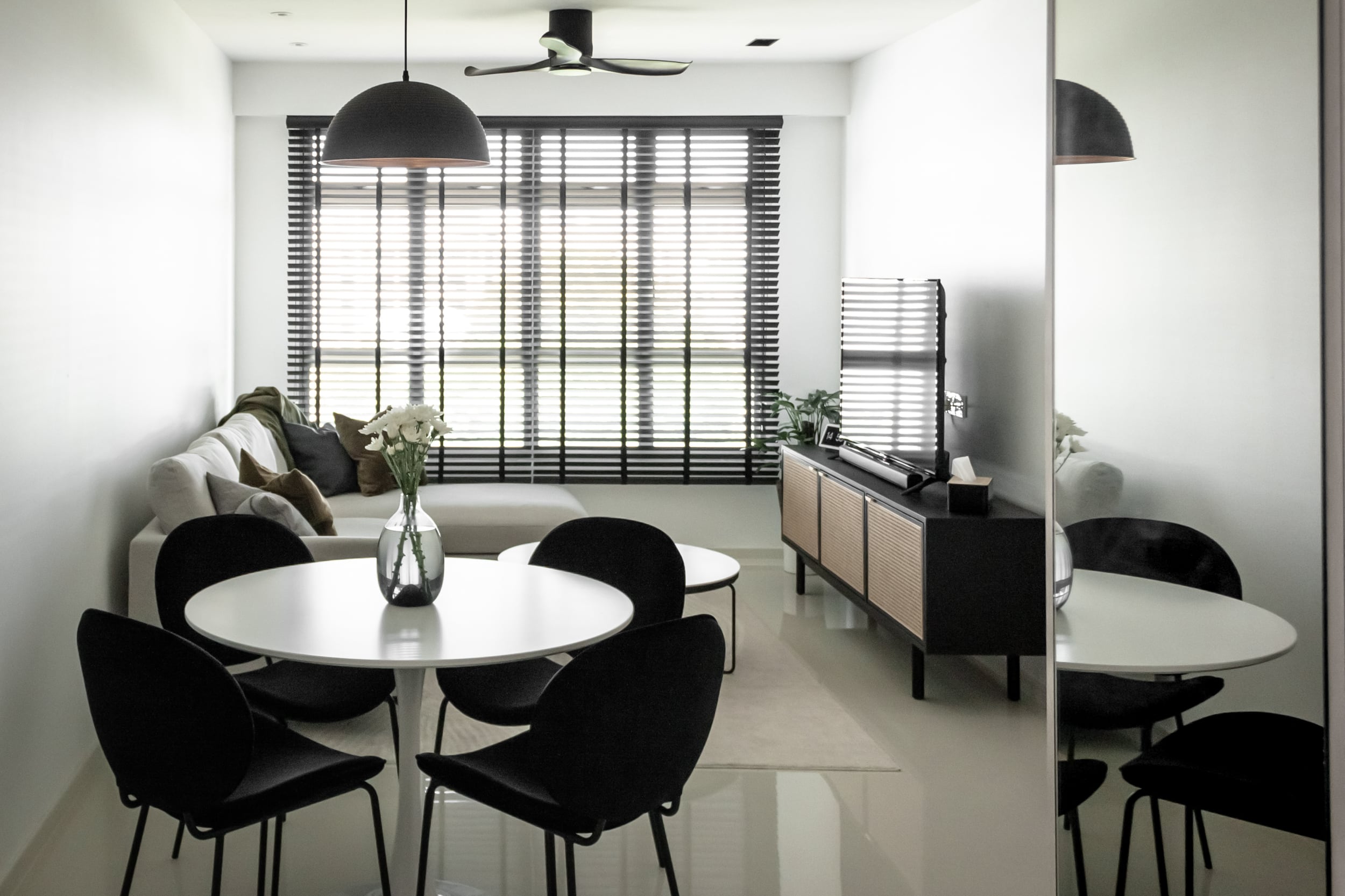
S also stuck to practical concerns, picking a design strategy that matched the existing flat’s structure:
“I did adhere to an overall strategy to reduce the architectural lines of the flat. For example, HDB flats have niches where the walls are thinner – I knew that if I wasn’t going to do anything with them that I’d want to get rid of them entirely. I had a false wall put in running from the front door and throughout the length of the living area, just to conceal the niche there. I did the same thing in the master bedroom as well.
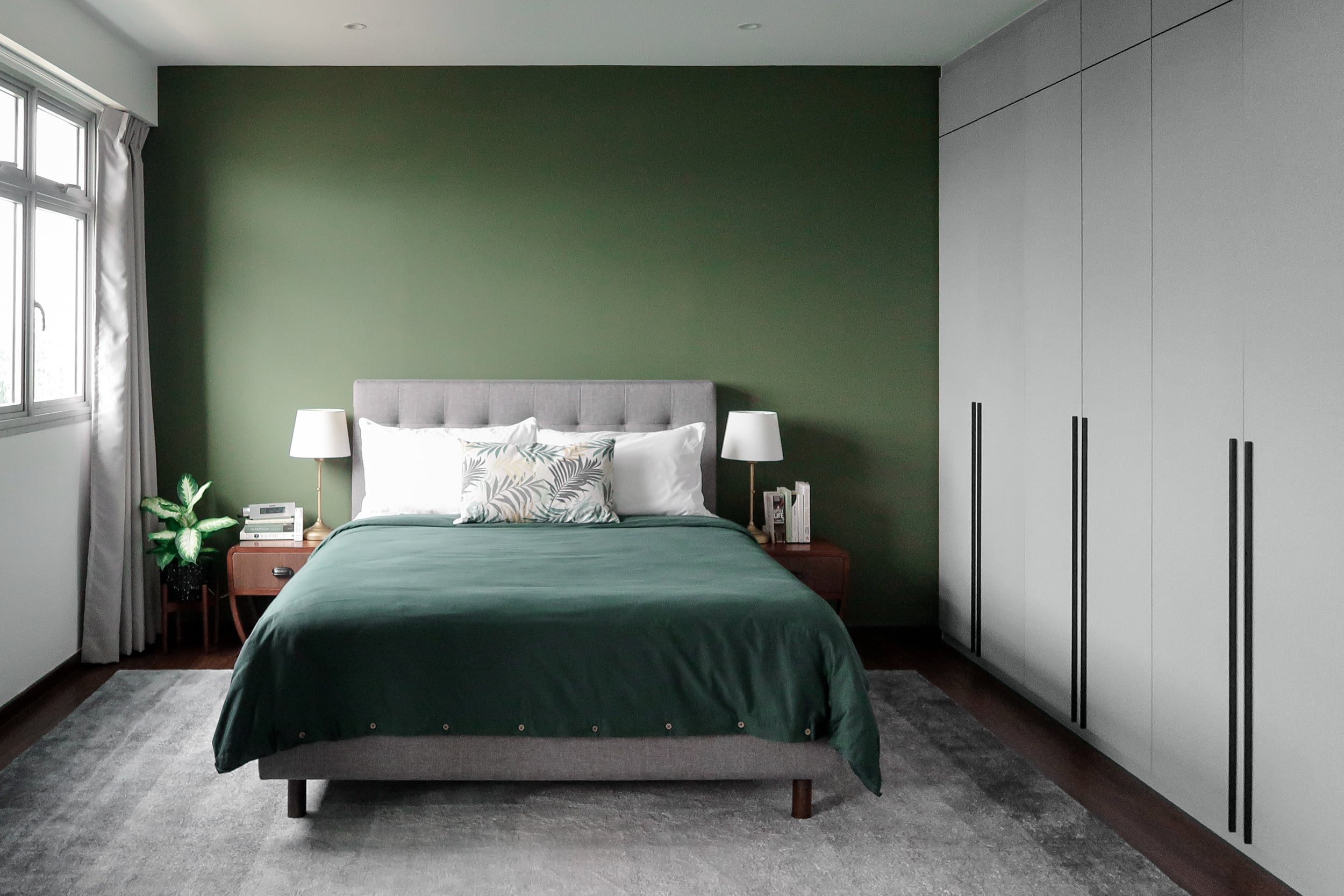
For false ceilings, I prefer those that stretch from wall to wall instead of the more popular L-box because the former creates fewer lines.
It’s the same reason why I’m not fond of cutouts in the false ceiling above the aircon unit. I made it so my false ceilings would span across entire spaces, but terminate completely wherever my aircons were located.
I had the box up for the air-con pipework in the hallway taken all the way to the ceiling. Again, this was to reduce the number of lines in the space.”
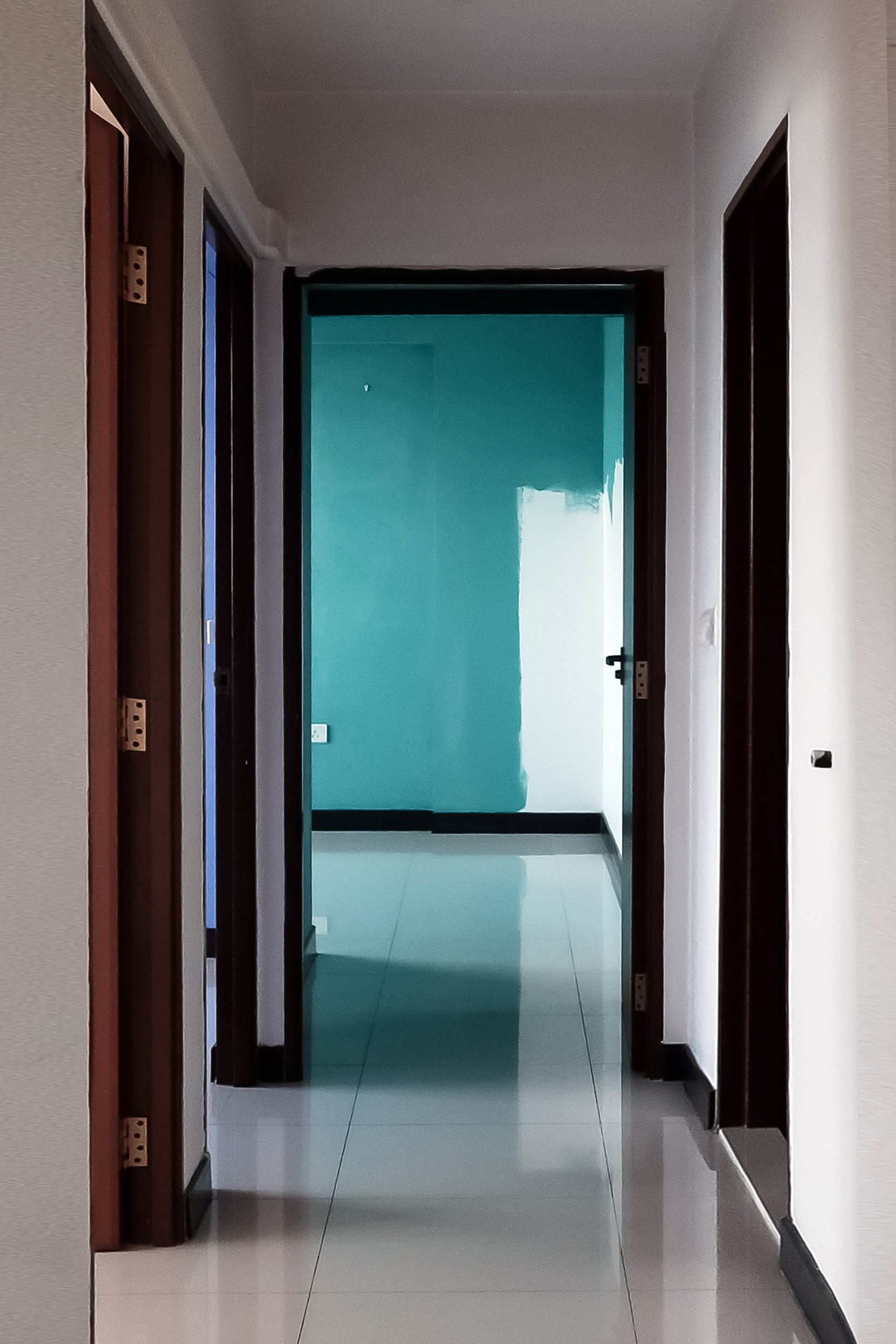

This approach is preferable to “forcing” a theme on a unit that isn’t suited to it. For example, forcing a French Cottage or Victorian theme on an HDB layout wouldn’t just seem odd – it would involve a tremendous cost in time and effort.
It’s better to have key needs in mind, rather than stubbornly clinging to one concept:
“I was able to achieve a clean, much more elevated looking space without doing much carpentry and minimal hacking,” S says.
“I think I ended up with a space that I’d describe as largely Japandi, with generous borrowings from Contemporary and Minimalist design themes. Even though what I wrote about in my design brief and what I ended up with are quite different, ultimately, I didn’t compromise on creating a home that was light, clean and calming.”
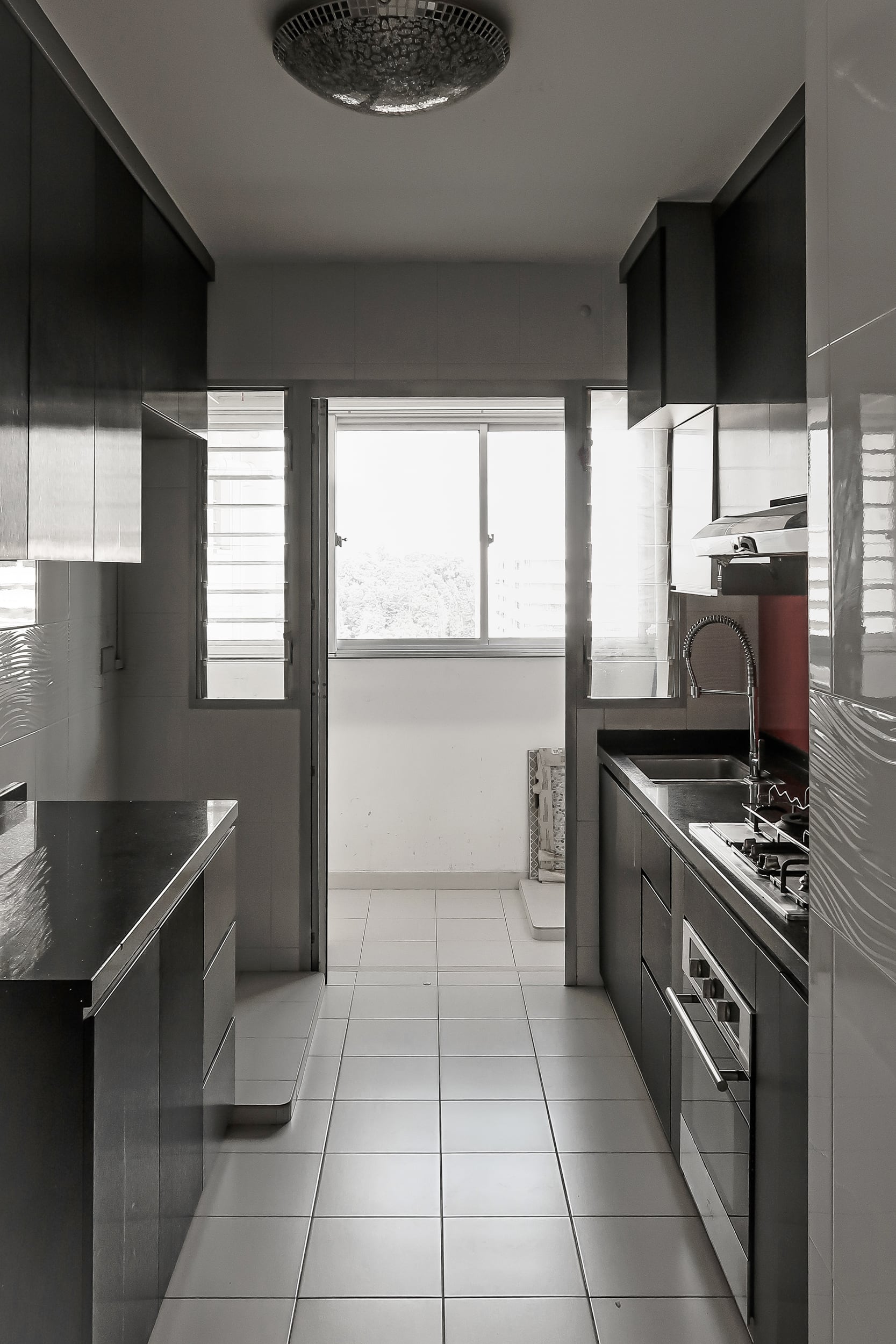
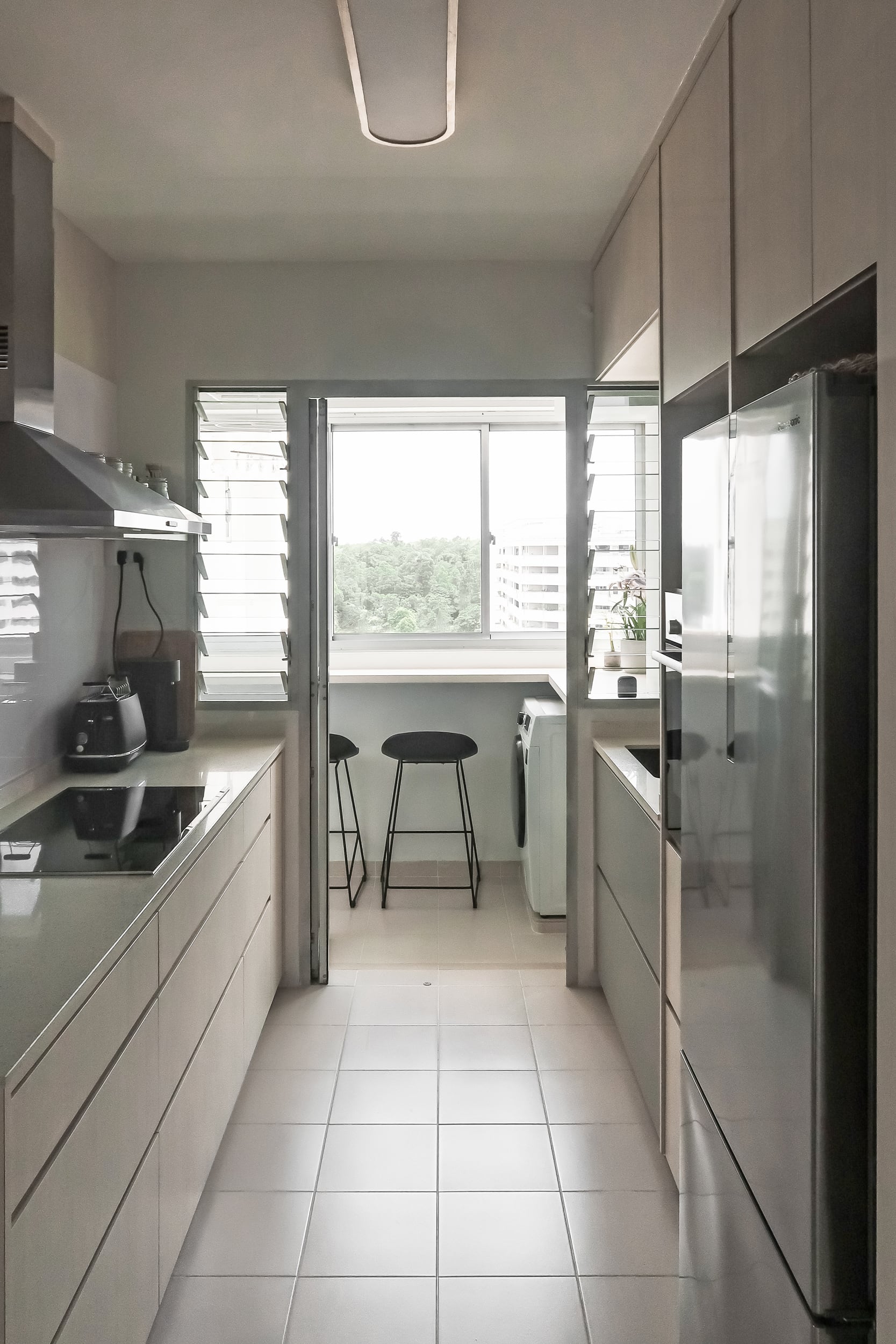
“I can’t speak for everyone,” S says, “But I felt some shame in buying property alone in my mid-30s. Past school and employment, the Singaporean roadmap is to find a partner, get married, apply for your BTO, and punch out 2.5 kids. So when you deviate from the norm, it takes a lot of courage to act on a Plan B.”
Although we’d point out this is far from uncommon these days. More Singaporeans are staying single for longer; and we’ve met singles well into their 50’s who are only now buying their own place.
The key is to buy when you feel right and ready. Don’t worry about when your friends, colleagues, etc. make their move.
S also found that his family took some time, to warm up to the idea of him moving out:
“Besides overcoming shame, you may feel the need to convince friends and family and anyone who feels entitled to have an opinion of your life. I started property hunting in 2019, and even though I mentioned it to my family, no one took me seriously!
[[nid:544233]]
Again, no one expected that I would stray from the partner-then-property life plan. When I started showing them pictures of properties I had viewed, they realised I was serious about moving out. Even then, it took a bit of time before they came around to the idea.”
The other issue was finding a property agent who was focused on what S needed, as opposed to the “salesly” types:
“I started property hunting on my own at first by using online listings, but after Circuit Breaker, I knew I needed an agent to help speed up the search.
A property agent that I was introduced to was a total nightmare! She simply couldn’t understand why I was in such a rush to buy my own place since I was single.
This property agent would spend hours on the phone with me, dissuading me from getting any resale properties, and pushing me towards new launches that would take several years to TOP! Sure, there would be a higher chance of capital appreciation, but that wasn’t my goal. She wouldn’t listen to me.
I’m fortunate that I later chanced upon William Tan from Singapore Realtors Inc. He was instrumental in helping me find my flat. William was the first person to actually listen to my needs, and even advised me on investment and exit strategies for all possible scenarios. We even discussed layout and interior design possibilities! William and I worked together over the course of two months before coming across this resale flat in Bukit Panjang.”
A good move by S was to speak to more than one agent. It never hurts to have a second opinion; and if the current agent isn’t working out for you, don’t hesitate to switch.
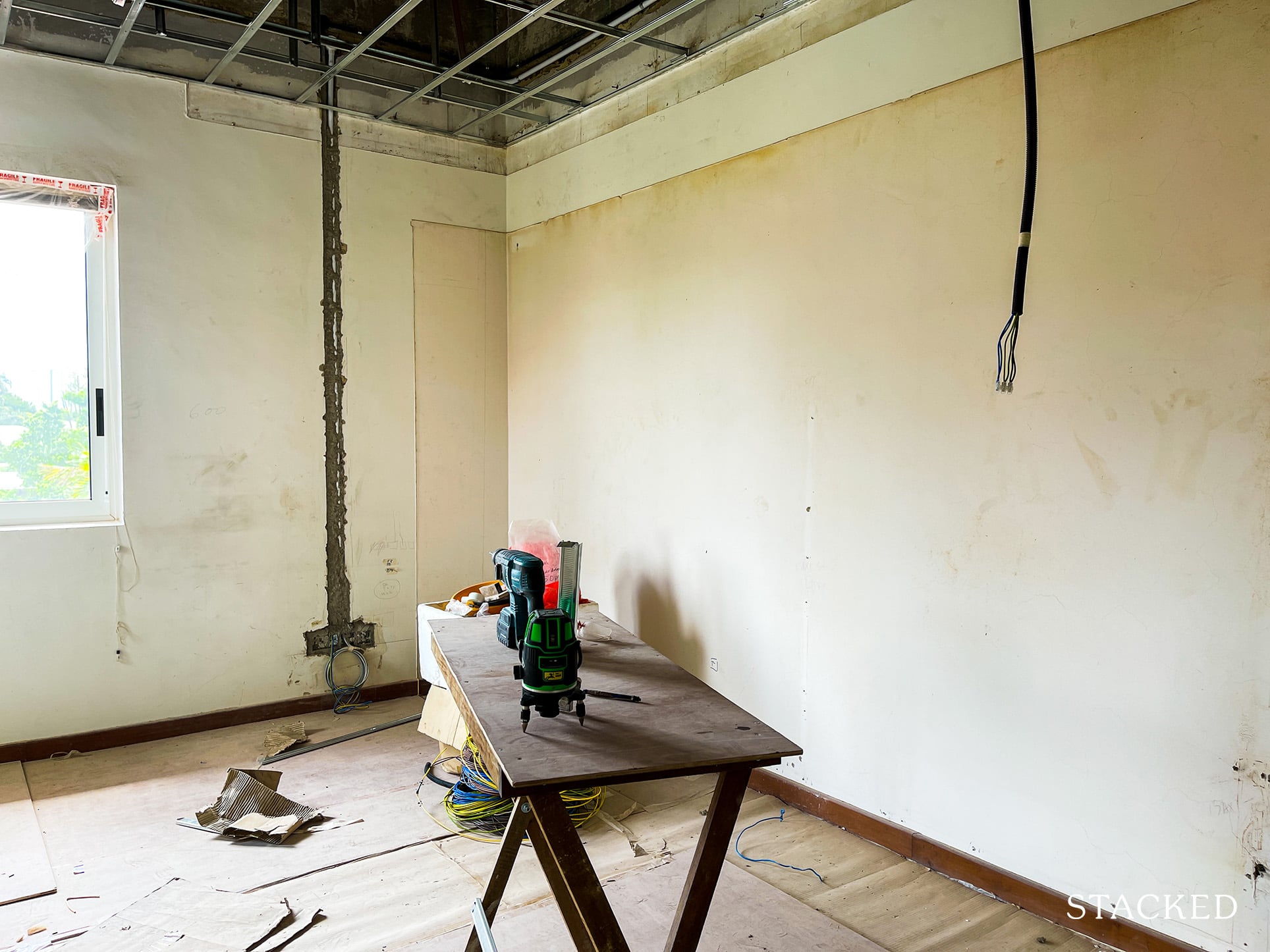
Resale flats don’t face construction delays; but don’t forget IDs face manpower and material shortages too.
“Hans had already warned me early on that manpower and material shortages would stretch our renovation timeline,” S says. “I couldn’t do much about manpower, but for materials like tiles and kitchen cabinetry parts which were out of stock, I tried my best to select available alternatives to reduce delays.
We’d started renovations right at the start of March, and I was hoping to move in three months later at the end of May, right before I turn 36. My birthday came and went, and the flat still wasn’t done yet. But I was able to move in just over a week later, so overall, renovations took about 13 weeks in total.”
S intends is happy to stay on for the next five years, until the Minimum Occupancy Period (MOP) is up. After that though, he has bigger plans ahead:
“Depending on the property market in the future and my finances, I would like to keep my flat to rent out, and get a second property, ABSD notwithstanding. More realistically, I’d sell my flat, and perhaps upgrade to a smaller condo unit. There’s also the scenario that if one or both of my parents become infirmed, I’d have to move back home to take care of them.”
S says that:
“We all have different reasons for wanting to move out and buy our own space. I’d say, Covid-19 or not, it helps to be absolutely clear what you want out of your dream space.
[[nid:537883]]
List down what are the non-negotiables and good-to-haves. And then, get yourself out there viewing properties as early (and as safely) as possible, even if you haven’t had the other things like finances and interior design completely figured out.
Seeing the real thing is the only way to determine if your wishlist is feasible, or filled with pipe dreams.
The good thing is that if you’re single, you only have to answer to yourself. If it’s truly your dream to have your own place, plan for it, go out and buy it, and fill it with things you love. Last year, I was watching a bachelor’s home tour video on the Apartment Therapy YouTube channel, and in it, the homeowner says, ‘A home is truly a love letter to yourself.’ I really think there’s something to that.
This article was first published in Stackedhomes.